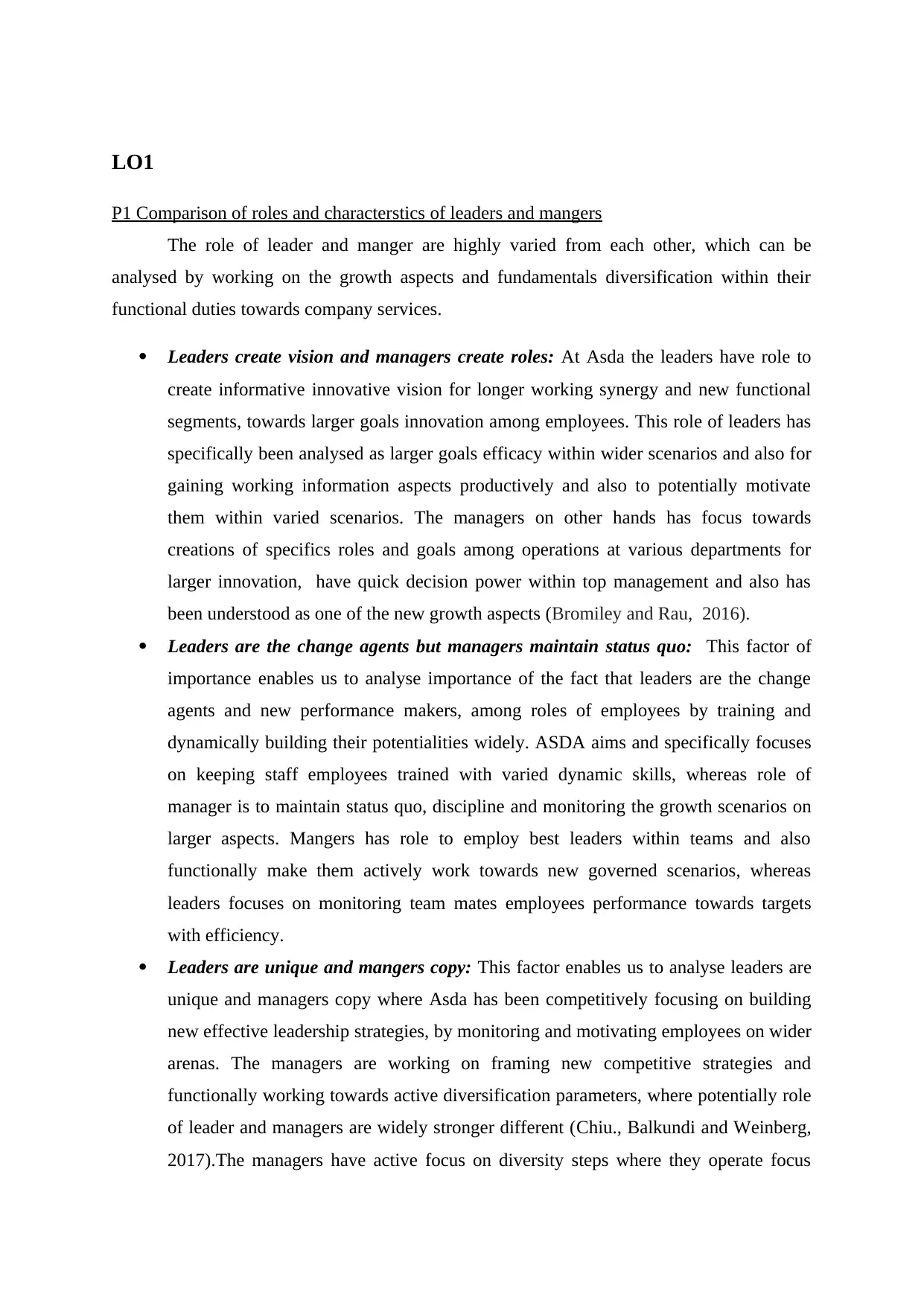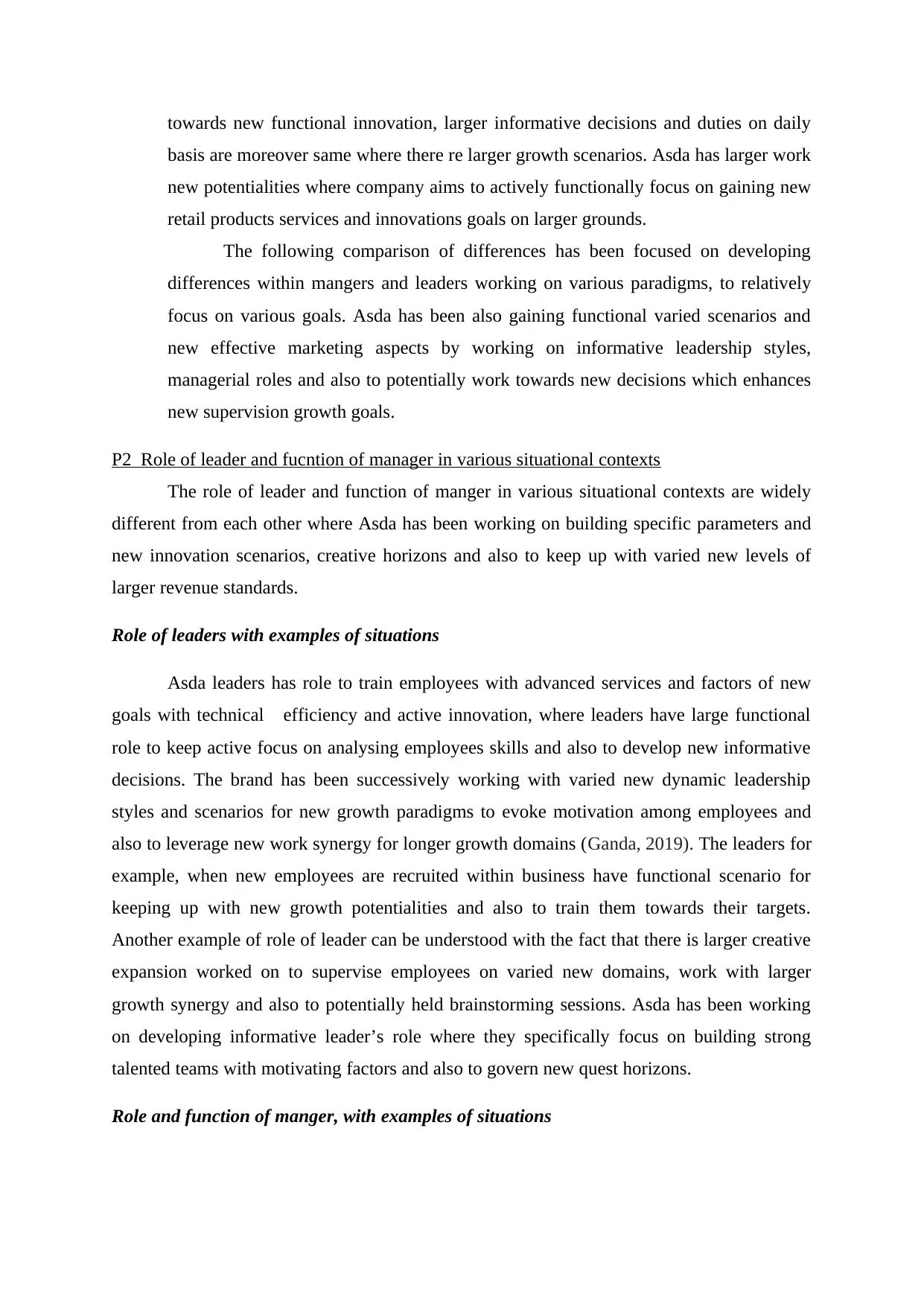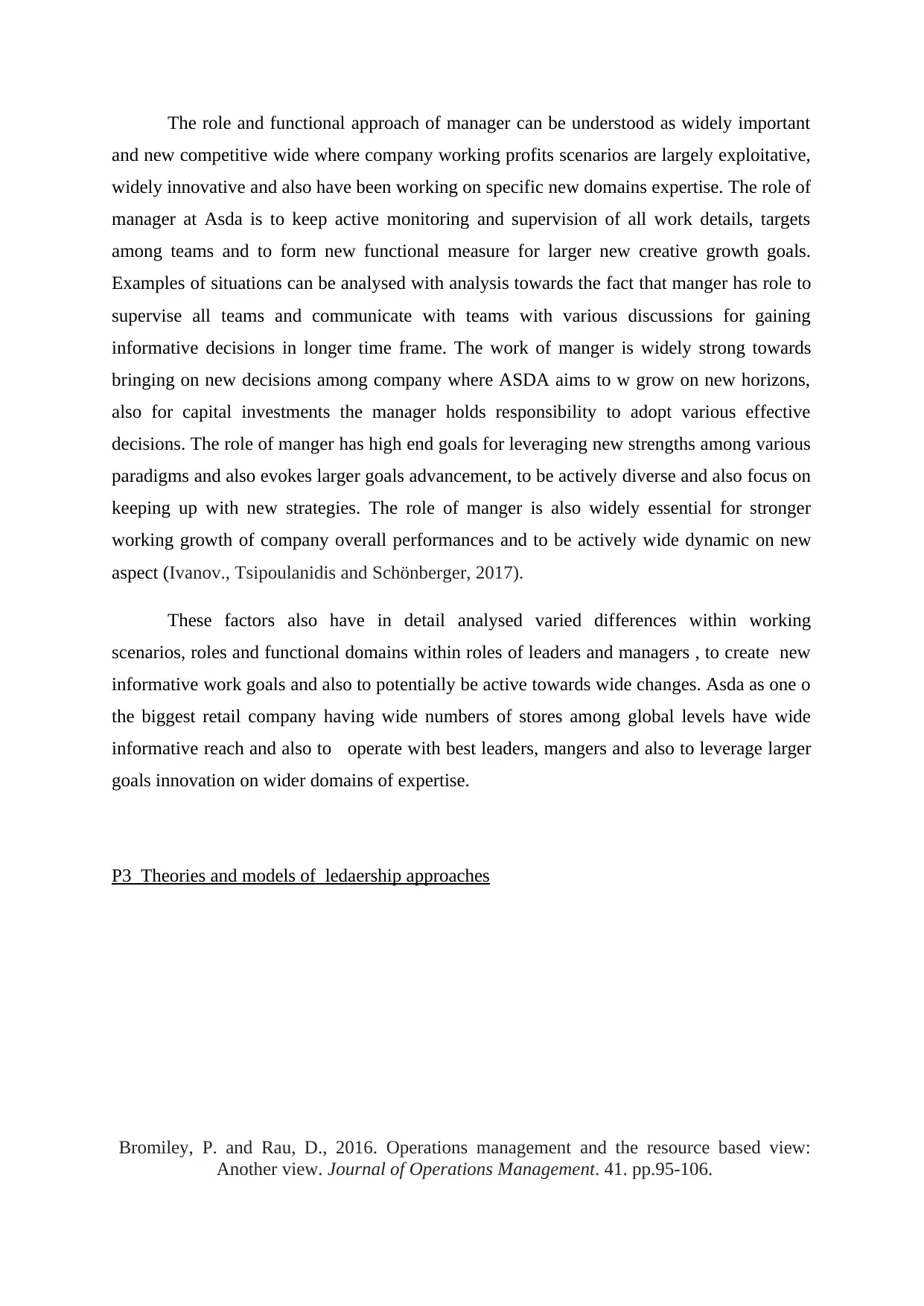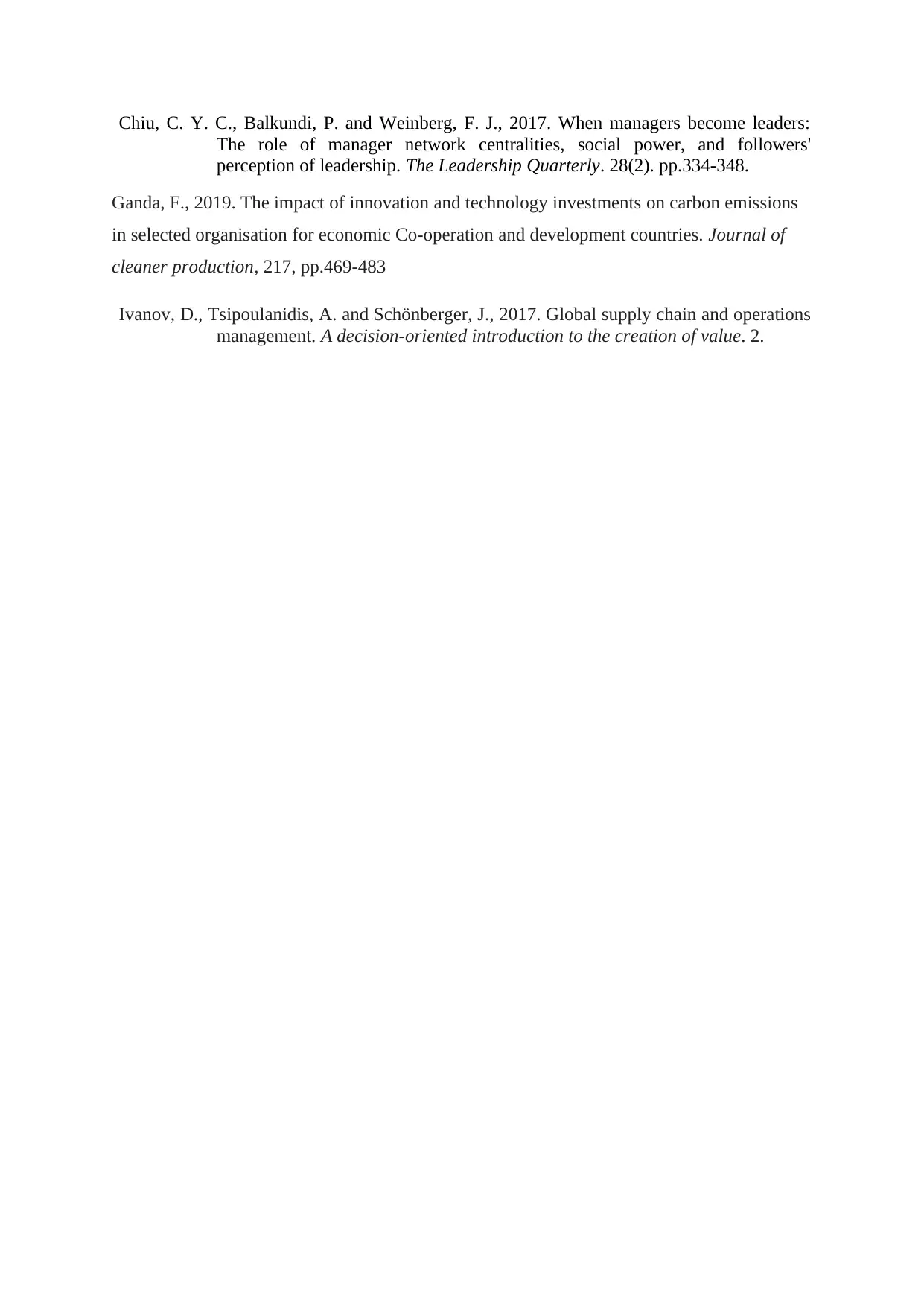Leadership & Management: Roles, Contexts, Theories, and Models
VerifiedAdded on 2023/01/05
|4
|1200
|90
Report
AI Summary
This report provides a comparative analysis of the roles of leaders and managers, highlighting their distinct characteristics and functions within an organizational context, using Asda as a case study. The report examines the creation of vision versus the creation of roles, change management versus maintaining the status quo, and the uniqueness of leaders compared to the tendency of managers to copy. Furthermore, it delves into the roles of leaders and managers in various situational contexts, providing examples of how they operate to drive growth and innovation. The report also discusses leadership theories and models, referencing relevant literature to support its findings. The report emphasizes the importance of both leadership and management in achieving organizational goals and fostering a dynamic work environment. The report is a valuable resource for students looking to understand the nuances of leadership and management.

LO1
P1 Comparison of roles and characterstics of leaders and mangers
The role of leader and manger are highly varied from each other, which can be
analysed by working on the growth aspects and fundamentals diversification within their
functional duties towards company services.
Leaders create vision and managers create roles: At Asda the leaders have role to
create informative innovative vision for longer working synergy and new functional
segments, towards larger goals innovation among employees. This role of leaders has
specifically been analysed as larger goals efficacy within wider scenarios and also for
gaining working information aspects productively and also to potentially motivate
them within varied scenarios. The managers on other hands has focus towards
creations of specifics roles and goals among operations at various departments for
larger innovation, have quick decision power within top management and also has
been understood as one of the new growth aspects (Bromiley and Rau, 2016).
Leaders are the change agents but managers maintain status quo: This factor of
importance enables us to analyse importance of the fact that leaders are the change
agents and new performance makers, among roles of employees by training and
dynamically building their potentialities widely. ASDA aims and specifically focuses
on keeping staff employees trained with varied dynamic skills, whereas role of
manager is to maintain status quo, discipline and monitoring the growth scenarios on
larger aspects. Mangers has role to employ best leaders within teams and also
functionally make them actively work towards new governed scenarios, whereas
leaders focuses on monitoring team mates employees performance towards targets
with efficiency.
Leaders are unique and mangers copy: This factor enables us to analyse leaders are
unique and managers copy where Asda has been competitively focusing on building
new effective leadership strategies, by monitoring and motivating employees on wider
arenas. The managers are working on framing new competitive strategies and
functionally working towards active diversification parameters, where potentially role
of leader and managers are widely stronger different (Chiu., Balkundi and Weinberg,
2017).The managers have active focus on diversity steps where they operate focus
P1 Comparison of roles and characterstics of leaders and mangers
The role of leader and manger are highly varied from each other, which can be
analysed by working on the growth aspects and fundamentals diversification within their
functional duties towards company services.
Leaders create vision and managers create roles: At Asda the leaders have role to
create informative innovative vision for longer working synergy and new functional
segments, towards larger goals innovation among employees. This role of leaders has
specifically been analysed as larger goals efficacy within wider scenarios and also for
gaining working information aspects productively and also to potentially motivate
them within varied scenarios. The managers on other hands has focus towards
creations of specifics roles and goals among operations at various departments for
larger innovation, have quick decision power within top management and also has
been understood as one of the new growth aspects (Bromiley and Rau, 2016).
Leaders are the change agents but managers maintain status quo: This factor of
importance enables us to analyse importance of the fact that leaders are the change
agents and new performance makers, among roles of employees by training and
dynamically building their potentialities widely. ASDA aims and specifically focuses
on keeping staff employees trained with varied dynamic skills, whereas role of
manager is to maintain status quo, discipline and monitoring the growth scenarios on
larger aspects. Mangers has role to employ best leaders within teams and also
functionally make them actively work towards new governed scenarios, whereas
leaders focuses on monitoring team mates employees performance towards targets
with efficiency.
Leaders are unique and mangers copy: This factor enables us to analyse leaders are
unique and managers copy where Asda has been competitively focusing on building
new effective leadership strategies, by monitoring and motivating employees on wider
arenas. The managers are working on framing new competitive strategies and
functionally working towards active diversification parameters, where potentially role
of leader and managers are widely stronger different (Chiu., Balkundi and Weinberg,
2017).The managers have active focus on diversity steps where they operate focus
Paraphrase This Document
Need a fresh take? Get an instant paraphrase of this document with our AI Paraphraser

towards new functional innovation, larger informative decisions and duties on daily
basis are moreover same where there re larger growth scenarios. Asda has larger work
new potentialities where company aims to actively functionally focus on gaining new
retail products services and innovations goals on larger grounds.
The following comparison of differences has been focused on developing
differences within mangers and leaders working on various paradigms, to relatively
focus on various goals. Asda has been also gaining functional varied scenarios and
new effective marketing aspects by working on informative leadership styles,
managerial roles and also to potentially work towards new decisions which enhances
new supervision growth goals.
P2 Role of leader and fucntion of manager in various situational contexts
The role of leader and function of manger in various situational contexts are widely
different from each other where Asda has been working on building specific parameters and
new innovation scenarios, creative horizons and also to keep up with varied new levels of
larger revenue standards.
Role of leaders with examples of situations
Asda leaders has role to train employees with advanced services and factors of new
goals with technical efficiency and active innovation, where leaders have large functional
role to keep active focus on analysing employees skills and also to develop new informative
decisions. The brand has been successively working with varied new dynamic leadership
styles and scenarios for new growth paradigms to evoke motivation among employees and
also to leverage new work synergy for longer growth domains (Ganda, 2019). The leaders for
example, when new employees are recruited within business have functional scenario for
keeping up with new growth potentialities and also to train them towards their targets.
Another example of role of leader can be understood with the fact that there is larger creative
expansion worked on to supervise employees on varied new domains, work with larger
growth synergy and also to potentially held brainstorming sessions. Asda has been working
on developing informative leader’s role where they specifically focus on building strong
talented teams with motivating factors and also to govern new quest horizons.
Role and function of manger, with examples of situations
basis are moreover same where there re larger growth scenarios. Asda has larger work
new potentialities where company aims to actively functionally focus on gaining new
retail products services and innovations goals on larger grounds.
The following comparison of differences has been focused on developing
differences within mangers and leaders working on various paradigms, to relatively
focus on various goals. Asda has been also gaining functional varied scenarios and
new effective marketing aspects by working on informative leadership styles,
managerial roles and also to potentially work towards new decisions which enhances
new supervision growth goals.
P2 Role of leader and fucntion of manager in various situational contexts
The role of leader and function of manger in various situational contexts are widely
different from each other where Asda has been working on building specific parameters and
new innovation scenarios, creative horizons and also to keep up with varied new levels of
larger revenue standards.
Role of leaders with examples of situations
Asda leaders has role to train employees with advanced services and factors of new
goals with technical efficiency and active innovation, where leaders have large functional
role to keep active focus on analysing employees skills and also to develop new informative
decisions. The brand has been successively working with varied new dynamic leadership
styles and scenarios for new growth paradigms to evoke motivation among employees and
also to leverage new work synergy for longer growth domains (Ganda, 2019). The leaders for
example, when new employees are recruited within business have functional scenario for
keeping up with new growth potentialities and also to train them towards their targets.
Another example of role of leader can be understood with the fact that there is larger creative
expansion worked on to supervise employees on varied new domains, work with larger
growth synergy and also to potentially held brainstorming sessions. Asda has been working
on developing informative leader’s role where they specifically focus on building strong
talented teams with motivating factors and also to govern new quest horizons.
Role and function of manger, with examples of situations

The role and functional approach of manager can be understood as widely important
and new competitive wide where company working profits scenarios are largely exploitative,
widely innovative and also have been working on specific new domains expertise. The role of
manager at Asda is to keep active monitoring and supervision of all work details, targets
among teams and to form new functional measure for larger new creative growth goals.
Examples of situations can be analysed with analysis towards the fact that manger has role to
supervise all teams and communicate with teams with various discussions for gaining
informative decisions in longer time frame. The work of manger is widely strong towards
bringing on new decisions among company where ASDA aims to w grow on new horizons,
also for capital investments the manager holds responsibility to adopt various effective
decisions. The role of manger has high end goals for leveraging new strengths among various
paradigms and also evokes larger goals advancement, to be actively diverse and also focus on
keeping up with new strategies. The role of manger is also widely essential for stronger
working growth of company overall performances and to be actively wide dynamic on new
aspect (Ivanov., Tsipoulanidis and Schönberger, 2017).
These factors also have in detail analysed varied differences within working
scenarios, roles and functional domains within roles of leaders and managers , to create new
informative work goals and also to potentially be active towards wide changes. Asda as one o
the biggest retail company having wide numbers of stores among global levels have wide
informative reach and also to operate with best leaders, mangers and also to leverage larger
goals innovation on wider domains of expertise.
P3 Theories and models of ledaership approaches
Bromiley, P. and Rau, D., 2016. Operations management and the resource based view:
Another view. Journal of Operations Management. 41. pp.95-106.
and new competitive wide where company working profits scenarios are largely exploitative,
widely innovative and also have been working on specific new domains expertise. The role of
manager at Asda is to keep active monitoring and supervision of all work details, targets
among teams and to form new functional measure for larger new creative growth goals.
Examples of situations can be analysed with analysis towards the fact that manger has role to
supervise all teams and communicate with teams with various discussions for gaining
informative decisions in longer time frame. The work of manger is widely strong towards
bringing on new decisions among company where ASDA aims to w grow on new horizons,
also for capital investments the manager holds responsibility to adopt various effective
decisions. The role of manger has high end goals for leveraging new strengths among various
paradigms and also evokes larger goals advancement, to be actively diverse and also focus on
keeping up with new strategies. The role of manger is also widely essential for stronger
working growth of company overall performances and to be actively wide dynamic on new
aspect (Ivanov., Tsipoulanidis and Schönberger, 2017).
These factors also have in detail analysed varied differences within working
scenarios, roles and functional domains within roles of leaders and managers , to create new
informative work goals and also to potentially be active towards wide changes. Asda as one o
the biggest retail company having wide numbers of stores among global levels have wide
informative reach and also to operate with best leaders, mangers and also to leverage larger
goals innovation on wider domains of expertise.
P3 Theories and models of ledaership approaches
Bromiley, P. and Rau, D., 2016. Operations management and the resource based view:
Another view. Journal of Operations Management. 41. pp.95-106.
⊘ This is a preview!⊘
Do you want full access?
Subscribe today to unlock all pages.

Trusted by 1+ million students worldwide

Chiu, C. Y. C., Balkundi, P. and Weinberg, F. J., 2017. When managers become leaders:
The role of manager network centralities, social power, and followers'
perception of leadership. The Leadership Quarterly. 28(2). pp.334-348.
Ganda, F., 2019. The impact of innovation and technology investments on carbon emissions
in selected organisation for economic Co-operation and development countries. Journal of
cleaner production, 217, pp.469-483
Ivanov, D., Tsipoulanidis, A. and Schönberger, J., 2017. Global supply chain and operations
management. A decision-oriented introduction to the creation of value. 2.
The role of manager network centralities, social power, and followers'
perception of leadership. The Leadership Quarterly. 28(2). pp.334-348.
Ganda, F., 2019. The impact of innovation and technology investments on carbon emissions
in selected organisation for economic Co-operation and development countries. Journal of
cleaner production, 217, pp.469-483
Ivanov, D., Tsipoulanidis, A. and Schönberger, J., 2017. Global supply chain and operations
management. A decision-oriented introduction to the creation of value. 2.
1 out of 4
Related Documents
Your All-in-One AI-Powered Toolkit for Academic Success.
+13062052269
info@desklib.com
Available 24*7 on WhatsApp / Email
![[object Object]](/_next/static/media/star-bottom.7253800d.svg)
Unlock your academic potential
Copyright © 2020–2026 A2Z Services. All Rights Reserved. Developed and managed by ZUCOL.





